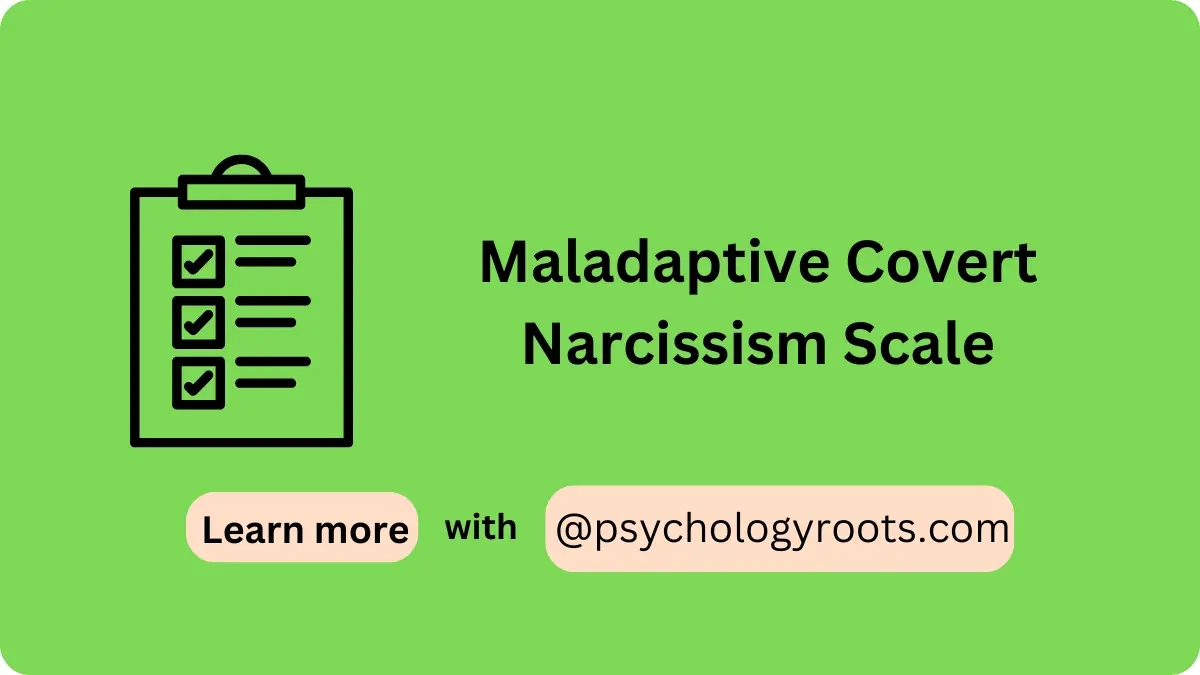Table of Contents
Maladaptive Covert Narcissism Scale
Here in this post, we are sharing the “Maladaptive Covert Narcissism Scale”. You can read psychometric and Author information. We have thousands of Scales and questionnaires in our collection (See Scales and Questionnaires). You can demand us any scale and questionnaires related to psychology through our community, and we will provide you with a short time. Keep visiting Psychology Roots.
About Maladaptive Covert Narcissism Scale
Scale Name
Maladaptive Covert Narcissism Scale
Author Details
Cheek, J. M., Wink, P. M., Hargreaves, K. M., & Derr, J. L.
Translation Availability
Not Sure

Background/Description
The Maladaptive Covert Narcissism Scale (MCNS) was developed by Cheek et al. (2013) to measure narcissistic traits that are expressed in more subtle or hidden ways, often described as “covert” or “vulnerable” narcissism. Unlike overt narcissism, which is openly expressed and can include grandiosity and attention-seeking behaviors, covert narcissism is characterized by hypersensitivity, insecurity, and a deep need for validation that may be concealed from others.
Individuals with high scores on this scale may exhibit feelings of inadequacy, self-consciousness, and a strong need for admiration but may avoid openly seeking attention. This type of narcissism is often linked to emotional distress and is associated with maladaptive coping mechanisms, which can impact personal relationships and mental health. The MCNS is a valuable tool for clinicians and researchers interested in exploring the less obvious, internalized aspects of narcissism that may not be apparent in social behaviors but affect a person’s internal experiences and self-perception.
Administration, Scoring and Interpretation
- Obtain the Copy: Access the scale through the original publication or academic databases where it is available.
- Purpose: To assess covert narcissistic tendencies, focusing on hidden feelings of grandiosity, sensitivity to criticism, and insecurity.
- Instructions: Participants are asked to rate their level of agreement with various statements on a Likert-type scale, which reflect covert narcissistic traits.
- Time: Approximately 10-15 minutes to complete.
- Administer the Scale: The MCNS can be self-administered or completed in a clinical setting, and it can be administered in either paper or online formats.
Reliability and Validity
The Maladaptive Covert Narcissism Scale has demonstrated good internal consistency and reliability, with Cronbach’s alpha values generally above 0.80. It has been validated through correlations with other measures of vulnerability, hypersensitivity, and self-esteem, supporting its construct validity. The scale has also shown stability over time, making it a reliable tool for assessing covert narcissistic traits.
Available Versions
23-Items
Reference
Cheek, J. M., Wink, P. M., Hargreaves, K. M., & Derr, J. L. (2013, July). Distinctions among overt, covert and adaptive types of narcissism: Conceptualization and measurement. In Proceedings of the 121st Annual Convention of the American Psychological Association, Honolulu, Hawaii (pp. 1-5).
Important Link
Scale File:
Frequently Asked Questions
What is covert narcissism?
Covert narcissism is a type of narcissism characterized by hypersensitivity, insecurity, and a need for admiration, but often expressed in hidden or subtle ways.
How is the Maladaptive Covert Narcissism Scale used?
It is used by clinicians and researchers to measure internalized, hidden narcissistic traits that may not be overtly expressed.
How reliable is this scale?
The scale has been shown to have high reliability and validity, with strong psychometric support.
Who can benefit from taking this scale?
Individuals in clinical or research settings, especially those interested in understanding covert forms of narcissism, may find this scale beneficial.
Disclaimer
Please note that Psychology Roots does not have the right to grant permission for the use of any psychological scales or assessments listed on its website. To use any scale or assessment, you must obtain permission directly from the author or translator of the tool. Psychology Roots provides information about various tools and their administration procedures, but it is your responsibility to obtain proper permissions before using any scale or assessment. If you need further information about an author’s contact details, please submit a query to the Psychology Roots team.
Help Us Improve This Article
Have you discovered an inaccuracy? We put out great effort to give accurate and scientifically trustworthy information to our readers. Please notify us if you discover any typographical or grammatical errors.
Make a comment. We acknowledge and appreciate your efforts.
Share With Us
If you have any scale or any material related to psychology kindly share it with us at psychologyroots@gmail.com. We help others on behalf of you.